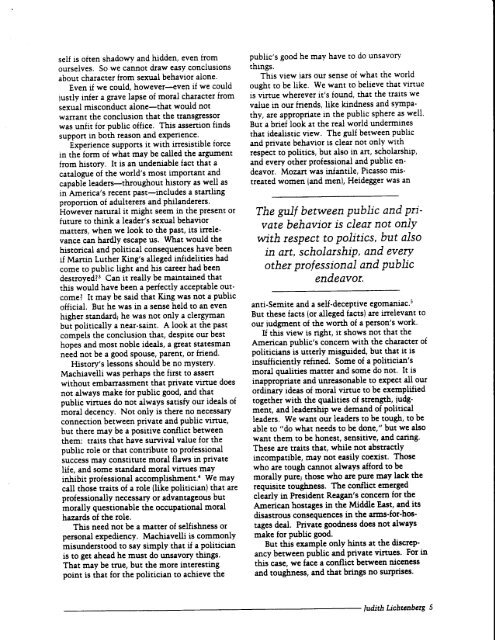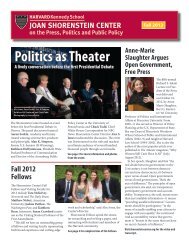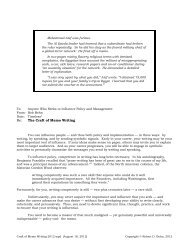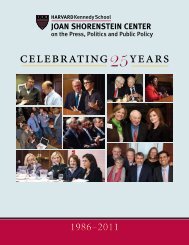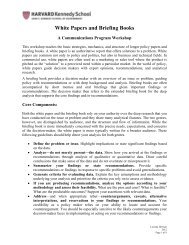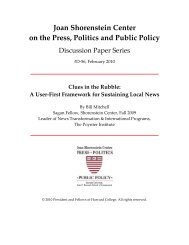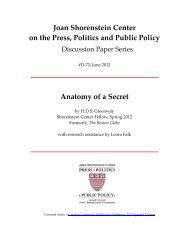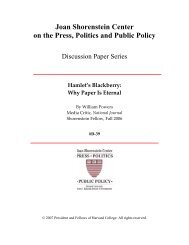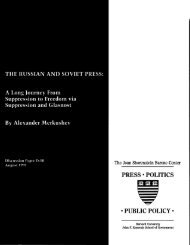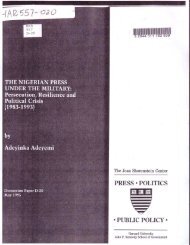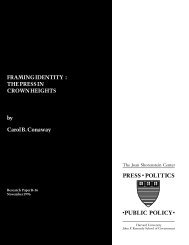PUBLIC POLICY - Joan Shorenstein Center on the Press, Politics ...
PUBLIC POLICY - Joan Shorenstein Center on the Press, Politics ...
PUBLIC POLICY - Joan Shorenstein Center on the Press, Politics ...
Create successful ePaper yourself
Turn your PDF publications into a flip-book with our unique Google optimized e-Paper software.
self is often shadowy and hidden, even hom<br />
ourselves. So we cannot draw easy c<strong>on</strong>ciusi<strong>on</strong>s<br />
about character hom sexual behavior al<strong>on</strong>e.<br />
Even il we could, however-even if we could<br />
tustly infer a grave lapse of moral character from<br />
sexual misc<strong>on</strong>duct al<strong>on</strong>e-that would not<br />
warrant <strong>the</strong> c<strong>on</strong>clusi<strong>on</strong> that <strong>the</strong> transgressor<br />
was unfit for public office. This asseni<strong>on</strong> finds<br />
support in both reas<strong>on</strong> and experience.<br />
Expenence supports it with irresistible force<br />
in <strong>the</strong> form of what may be calied <strong>the</strong> argument<br />
from history. It is an undeniable fact that a<br />
catalogue of <strong>the</strong> world's most imp<strong>on</strong>ant and<br />
capable leaders-throughout history as well as<br />
in America's recent past-includes a starthng<br />
propofti<strong>on</strong> of adulterers and philanderers.<br />
However natural it might seem in <strong>the</strong> present or<br />
future to think a leader's sexual behavior<br />
matters, when we look to <strong>the</strong> past, its irrele'<br />
vance can hardly escape us. What would <strong>the</strong><br />
historical and political c<strong>on</strong>sequences have been<br />
il Manin Lu<strong>the</strong>r King's alleged inIideiities had<br />
come to public light and his career had been<br />
destroyed?3 Can it really be maintained that<br />
this would have been a perfectly acceptable out'<br />
come? It may be said that King was not a public<br />
official. But he was in a sense held to an even<br />
higher standard; he was not <strong>on</strong>ly a clergyman<br />
but politically a near-saint. A look at <strong>the</strong> past<br />
compels <strong>the</strong> c<strong>on</strong>clusi<strong>on</strong> that, despite our best<br />
hopes and most noble ideals, a great statesman<br />
need not be a good spouse, parent, or friend'<br />
History's less<strong>on</strong>s should be no mystery-<br />
Machiaveili was perhaps <strong>the</strong> first to assert<br />
without embarrassment that private virnre does<br />
not dways make for public good, and that<br />
public vinues do not always satisfy our ideals of<br />
moral decency. Not <strong>on</strong>iy is <strong>the</strong>re no necessary<br />
c<strong>on</strong>necti<strong>on</strong> between private and pubiic virtue,<br />
but <strong>the</strong>re may be a positive c<strong>on</strong>llict between<br />
<strong>the</strong>m: traits that have survival value for <strong>the</strong><br />
public role or that c<strong>on</strong>tribute to professi<strong>on</strong>al<br />
success may c<strong>on</strong>stitute moral flaws in private<br />
lile, and some standard moral vinues may<br />
inhibit professi<strong>on</strong>al accomplishment.a We may<br />
call those traits of a role (like politicianl that are<br />
professi<strong>on</strong>ally necessary or advantageous but<br />
morally questi<strong>on</strong>able <strong>the</strong> occupati<strong>on</strong>al moral<br />
hazards of <strong>the</strong> role.<br />
This need not be a matter of seUishness or<br />
pers<strong>on</strong>al expediency. Machiavelli is comm<strong>on</strong>ly<br />
misunderstood to say simply that if a poiitician<br />
is to get ahead he must do unsavory things.<br />
That may be true, but <strong>the</strong> more interesting<br />
point is that for <strong>the</strong> politician to achieve <strong>the</strong><br />
public's good he may have to do unsavory<br />
thrngs.<br />
This view iars our sense of what <strong>the</strong> world<br />
ought to be like. We want to believe that vrrtue<br />
is vr,nue wherever it's found, that <strong>the</strong> uaits we<br />
value in our fnends, like kindness and sympa'<br />
thy, are appropnate in <strong>the</strong> public sphere as well.<br />
But a brief look at <strong>the</strong> real world undermines<br />
that idealistic view. The gulf between public<br />
and private behavior is clear not <strong>on</strong>ly with<br />
respect to politics, but aiso in art, scholarshrp,<br />
and every o<strong>the</strong>r professi<strong>on</strong>al and public en'<br />
deavor. Mozan was infantile, Picasso mis'<br />
treated women (and men), Heidegger was an<br />
The gilf between public and Private<br />
behavior is clear not <strong>on</strong>l7<br />
with rcspect to politics, but also<br />
in art, scholarship, and every<br />
o<strong>the</strong>r professi<strong>on</strong>al and Public<br />
endeav<strong>on</strong><br />
anti-Semite and a self-decePtive egomaniac.'<br />
But <strong>the</strong>se facts (or alleged facts) are irrelevant to<br />
our iudgment of <strong>the</strong> w<strong>on</strong>h of a pers<strong>on</strong>'s work.<br />
lf this view is right, it shows not that <strong>the</strong><br />
Amencan public's c<strong>on</strong>cern with <strong>the</strong> character of<br />
politicians is utterly misguided, but that it is<br />
insulficiently refined. Some of a politician's<br />
moral qualities mattet and some do not. It is<br />
inappropnate and unreas<strong>on</strong>able to expect all our<br />
ordinary ideas of moral virtue to be exemplilied<br />
roge<strong>the</strong>r with <strong>the</strong> qualities of strength, iudgment,<br />
and leadership we demand of political<br />
leaders. We want ow leaders to be tough, to be<br />
able to "do what needs to be d<strong>on</strong>e," but we also<br />
want <strong>the</strong>m to be h<strong>on</strong>est, sensitive, and caring.<br />
These are uaits that, while not abstractly<br />
incompatible, may not easily coexist. Those<br />
who are tougb cannot always afford to be<br />
morally pwer those who are pure may lack <strong>the</strong><br />
requisite toughness. <strong>the</strong> c<strong>on</strong>flict emerged<br />
clearly in President Reagan's c<strong>on</strong>cem for <strong>the</strong><br />
Asrerican hostages in <strong>the</strong> Middle East, and its<br />
disastrous c<strong>on</strong>sequences in <strong>the</strong> arms'for'hos'<br />
tages deal. Frivate goodness does not always<br />
make for public good.<br />
But this example <strong>on</strong>ly hints at <strong>the</strong> discrep'<br />
ancy between public and private virtues. For in<br />
this case, we face a c<strong>on</strong>llict between niceness<br />
and tougbness, and that brings no surprises.<br />
ludith Lichtenberg


